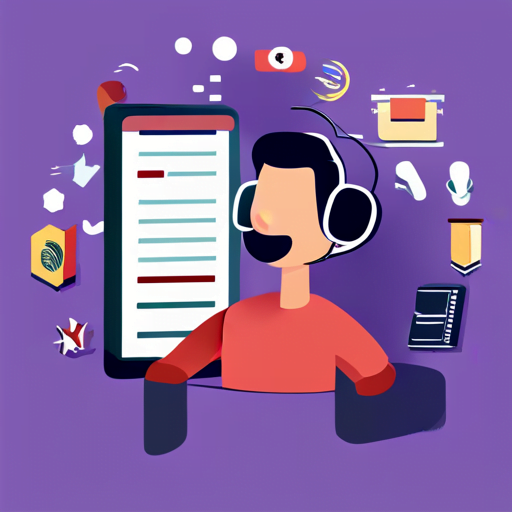Are you looking to learn a new language, but struggling to find the time to fit it into your busy schedule? Have you considered using audiobooks as a language learning tool?
Not only are audiobooks convenient for on-the-go learning, but they can also be an effective way to improve your language skills.
In this article, we’ll explore the benefits of using audiobooks for language learning, how to choose the right audiobook for your skill level and interests, tips for effective use of audiobooks, and how to supplement your learning with other methods.
With the right approach, you can become fluent in no time with the help of audiobooks.
Table of Contents
Benefits of Using Audiobooks for Language Learning

Using audiobooks to learn a new language offers amazing advantages that can boost your progress and make your experience more enjoyable.
With audiobooks, you can immerse yourself in the language and listen to native speakers, which helps you develop a more accurate accent and pronunciation. It’s also a convenient way to practice your listening skills and get familiar with the language’s rhythm and intonation.
Audiobooks allow you to learn on-the-go, whether you’re commuting, exercising, or doing household chores. They also offer a wide range of content, from beginner to advanced levels, and various genres such as fiction, non-fiction, and language courses.
Overall, using audiobooks can make language learning more accessible, engaging, and effective.
Choosing the Right Audiobook

Picking the appropriate audiobook is crucial to ensure effective language acquisition. When choosing an audiobook, make sure to consider your current language level and your learning goals.
If you’re a beginner, look for audiobooks with simple vocabulary and sentence structures. If you’re an intermediate or advanced learner, choose audiobooks that challenge you with more complex grammar and vocabulary. It’s also important to choose audiobooks narrated by native speakers to improve your pronunciation and listening comprehension.
Lastly, choose a topic that interests you to keep yourself engaged and motivated throughout the learning process. By choosing the right audiobook, you can maximize your language learning potential and become fluent in no time.
Tips for Effective Use of Audiobooks

Get the most out of your language acquisition journey with these tips on how to effectively utilize audiobooks.
First and foremost, make sure to actively listen to the audiobook instead of just letting it play in the background. Focus on understanding the words and phrases being spoken, and try to follow along with the text if available.
Additionally, repetition is key in language learning, so don’t be afraid to listen to the same audiobook multiple times. It’s also important to vary the types of audiobooks you listen to, including different accents and speeds, to improve your comprehension skills.
Finally, try to incorporate what you’ve learned from the audiobooks into your daily life, such as practicing conversation and writing exercises, to reinforce your language skills. By following these tips, you’ll be well on your way to becoming fluent in no time.
Supplementing Audiobooks with Other Language Learning Methods

By combining audiobooks with other language learning methods, you’ll be able to enhance your language acquisition journey and feel more confident in your abilities.
One great way to supplement your audiobook listening is to practice speaking with a language partner or tutor. This allows you to practice your pronunciation and conversation skills in a real-life setting.
Additionally, using language learning apps like Duolingo or Memrise can help reinforce vocabulary and grammar concepts that you encounter in your audiobooks.
Finally, immersing yourself in the language by watching movies or TV shows, reading books, or listening to music can also help solidify your understanding of the language and make it feel more natural to you.
So, while audiobooks can be a powerful tool in language learning, combining them with other methods can help you make even more progress towards fluency.
Tracking Progress and Staying Motivated
As you continue on your language learning journey, it’s important to stay motivated and track your progress. One way to do this is by setting achievable goals for yourself, such as mastering a certain number of vocabulary words or completing a specific chapter in your audiobook.
You can also use language learning apps or websites to track your progress and see how far you’ve come. Another helpful tip is to find a language learning partner or join a language exchange group to practice speaking with others and receive feedback on your progress.
Celebrate your successes along the way, no matter how small they may seem, and don’t be discouraged by setbacks. Remember, learning a language is a journey, not a destination, and the process is just as important as the end result.
Frequently Asked Questions
How long will it take to become fluent in a new language using audiobooks?
If you’re wondering how long it’ll take to become fluent in a new language using audiobooks, the answer depends on several factors. Your current level of proficiency, the amount of time you can commit to learning, and the complexity of the language you’re trying to learn all play a role.
However, audiobooks can help speed up the process. They provide you with authentic language input, improve your listening skills, and expose you to different accents and dialects.
With consistent practice and dedication, you can make significant progress in a relatively short amount of time.
Can audiobooks be used for learning multiple languages at once?
Are you looking to learn multiple languages at once? Audiobooks can be a great tool to achieve this goal.
With audiobooks, you can listen to different languages in a convenient and flexible way. You can even switch between languages as you please, allowing you to practice and improve your skills constantly.
By using audiobooks, you can save time and money on language courses, and focus on learning at your own pace. With consistent practice and dedication, you can become proficient in multiple languages in no time.
What are some common mistakes to avoid when using audiobooks for language learning?
To avoid common mistakes when using audiobooks for language learning, you should always choose materials at your level. Don’t try to jump ahead to more advanced content before you’re ready, or you risk becoming frustrated and discouraged.
Additionally, make sure to actively engage with the material by repeating words and phrases out loud, and by taking notes on new vocabulary and grammar points.
Finally, be consistent in your practice, setting aside regular time each day to listen and learn. With these strategies in mind, you’ll be well on your way to improving your language skills with audiobooks.
Are there any specific genres or types of audiobooks that are more effective for language learning?
To maximize your language learning experience with audiobooks, it’s important to choose the right genre or type of book. Opt for books that interest you and are at your current language level.
Listening to children’s or young adult books can be helpful for beginners, as they tend to have simpler vocabulary and grammar. If you’re more advanced, try listening to news broadcasts or podcasts in your target language.
Biographies and memoirs can also be effective, as they expose you to different cultural perspectives and help you understand the nuances of the language.
Remember, the key is to stay engaged and interested in what you’re listening to, so you can absorb the language naturally and effortlessly.
How can audiobooks help with pronunciation and speaking skills?
Improving your pronunciation and speaking skills is essential to mastering a new language. One way to do this is by using audiobooks, which provide you with a native speaker’s pronunciation and intonation.
This is particularly helpful if you don’t have access to a language partner or tutor. By listening to a variety of audiobooks, you can also expose yourself to different accents and dialects, which will help you understand and communicate with a wider range of people.
Additionally, audiobooks allow you to practice speaking and repeating phrases, which is crucial for building your confidence and fluency. Overall, incorporating audiobooks into your language learning routine can be a powerful tool for improving your pronunciation and speaking skills.
Conclusion
So now you know how audiobooks can help you become fluent in a new language in no time. By listening to native speakers, you can improve your pronunciation and comprehension skills, and by choosing the right materials, you can learn the language in a way that suits your needs and interests.
Remember to use effective listening strategies, take notes, and practice speaking as much as possible to get the most out of your audiobook experience.
However, keep in mind that audiobooks are just one tool in your language learning toolbox. To truly become fluent, it’s important to supplement your audiobook learning with other methods such as speaking with native speakers, writing, and practicing grammar exercises.
With dedication and persistence, you can achieve your language learning goals and enjoy all the benefits that come with being multilingual. Happy learning!
